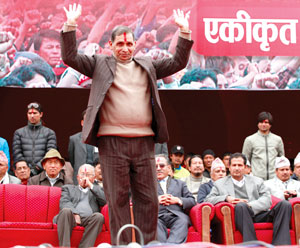 BIKRAM RAI Now it's Chairman Dahal and Chairman Baidya |
The split that had Mohan Baidya jumping off the UCPN-Maoist wagon and opening the rival CPN, Maoist was not just a move from a dash to a comma. Most significantly, it has weakened the rump party and constricted the ability of Pushpa Kamal Dahal to run roughshod over the polity as he has since 2006.
Till the last, many thought talk of a split was one more ploy by the wily Dahal to get his way with the peace process and constitution-drafting. Certainly, the cause of the breakup was less ideology and more the centralisation of brute power, state power and wealth in the hands of the UCPN-Maoist chairman.
The Baidya faction, today the Baidya party, suffered as the UCPN-Maoist 'establishment' took plum posts and Dahal became personally powerful and prosperous on account of years of extortion and loot of the exchequer, economy and ex-combatants.
In autumn 2005, while Baidya stewed in an Indian gaol, Dahal decided to abandon his underground royalist line and make common cause with Baburam Bhattarai's India tilt. Baidya was left fuming at the betrayal of his line of 'revolution', and as the party came above ground he pushed for reinstatement of the radical agenda through the Kami Danda, Kharipati and Palungtar conclaves. He seemed not to understand that what Bhattarai and Dahal sought now was not revolution, but capture of state power by whichever means.
Dahal was willing to use Baidya line as long as it served his career track, and he would have enjoyed building a
one-party state if that became a possibility. For this, he made the people suffer what in retrospect was a six-year charade of election, peace-process and constitution-writing. Dahal also sought to avoid a split in the party because of the ability of the splinter group to expose his cross-border shenanigans, wartime blunders and the stashing of plunder.
While underground, the party had the ability to limit factionalism through selective violence, 'self-criticism' and non-transparency. The dynamics changed with the emergence into above-ground politics, with journalists at the gate, which could not but widen the rift between the former mentor (Baidya) and pupil (Dahal).
The split would have been less disastrous for Dahal had he stayed true to the spirit of the 12-point agreement of November 2005 by formally abandoning political violence and democratising the Maoist party. Instead, he balked on his promises, intimidated the populace during the 2008 elections, bamboozled the gullible leadership of UNMIN, worked assiduously to weaken every institution of the state, and sought to buy back the prime ministership in 2010 with a Rs 500 million injection.
When he became the elected prime minister in April 2008, Dahal's position was unassailable as the uncontested leader of the Maoist party, the toast of overseas internationals and the New Delhi intelligentsia. With such backing, he could have led the Maoists into a democratic makeover and forced Baidya and his cohort of radicals to join up or depart. He would have emerged a statesman and won the right to long-term stewardship of the country over successive elections.
But Dahal lacked personal guts and democratic vision. Unwilling to ensure a democratic future for his party, he sought instead to be its chairman-for-life. Whether it was due to insecurity or megalomania, he tried to use the Constituent Assembly for his personal project of being crowned directly-elected president.
Dahal sought once more to cultivate New Delhi after getting over his 2008-2010 bout of severe anti-Indianitis. His most significant peace prasad to New Delhi was the anointment of Baburam Bhattarai as prime minister in August 2011, only to watch aghast as the latter sought furiously to entrench himself using every means including the machinery of state.
Meanwhile, the blood-letting continued within the party as the politically motivated cadre and committed ex-fighters gravitated towards Baidya. Many late-comer opportunists and conflict era perpetrators (think 'Bal Krishna Dhungel') sought shade under the Dahal-Bhattarai tent.
When the Maoists came above ground in 2006, there was general belief that the party should remain united, in the hope that the leadership would ready the rank-and-file for peace and democracy. Six wasted years later, one would be forgiven for being indifferent to the breakup that has occurred.
Chairman Dahal and Vice Chairman Bhattarai of the UCPN-M and Chairman Baidya of the CPN, M are the threesome who crafted and implemented the 'people's war' against parliamentary democracy in 1996. They led the country down the continuous path of political instability and economic decline. The first two are in the process of opportunistic accommodation, while Baidya now plans to re-ignite revolt and revolution ("if required").
Chairman Baidya should be informed that ten years of war and six years of deception have led to the further impoverishment of Nepal's already poor. He carries at least a third of the blame.
Read also:
Split ends of a revolution, ANURAG ACHARYA
What was surprising about the great Maoist breakup this week was the lack of fuss



